Tibialis anterior - Study guides, Class notes & Summaries
Looking for the best study guides, study notes and summaries about Tibialis anterior? On this page you'll find 1487 study documents about Tibialis anterior.
Page 2 out of 1.487 results
Sort by
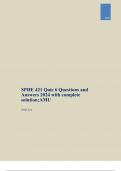
-
SPHE 421 Quiz 6 Questions and Answers 2024 with complete solution;AMU
- Exam (elaborations) • 10 pages • 2024
- Available in package deal
-
- $13.49
- + learn more
SPHE 421 Quiz 6 Questions and Answers 2024 with complete solution;AMU Which muscle has its origin on the lateral tibia and interosseus membrane and inserts on the first cuneiform and first metatarsal? Question options: Anterior tibialis Posterior tibialis Extensor hallucis longus Extensor digitorum longus Question 2 2 / 2 points If a patient has damage to the nerve supplying the anterior compartment of the lower leg, you would expect to focus efforts on strengthening which group of m...
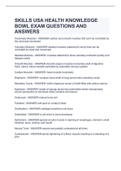
-
SKILLS USA HEALTH KNOWLEDGE BOWL EXAM QUESTIONS AND ANSWERS
- Exam (elaborations) • 21 pages • 2023
- Available in package deal
-
- $12.99
- 3x sold
- + learn more
Involuntary Muscles - ANSWER-cardiac and smooth muscles that can't be controlled by the mind and movement Voluntary Muscles - ANSWER-skeletal muscles (attached to bone) that can be controlled by mind and movement Skeletal Muscles - ANSWER--muscles attached to bone-voluntary-contracts quickly and fatigues easily Smooth Muscles - ANSWER-visceral (organ) muscles-involuntary-wall of digestive track, uterus, blood vessels-controlled by automatic nervous system Cardiac Muscles - ANSWER--h...
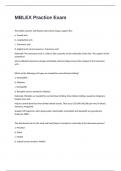
-
MBLEX Practice Exam 2024/2025 with 100% correct answers
- Exam (elaborations) • 37 pages • 2024
-
- $17.49
- + learn more
The tibialis anterior and fibularis (peroneus) longus support the: a. Frontal arch b. Longitudinal arch c. Transverse arch d. Sagittal arch correct answersc. Transverse arch Rationale: The transverse arch is a side-to side concavity on the underside of the foot. The support of the anatomical stirrup (fibularis (peroneus) longus and tibialis anterior) helps prevent the collapse of the transverse arch. Which of the following cell types are needed for normal blood clotting? a. Neutrophils...
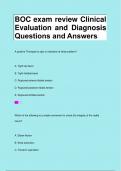
-
BOC exam review Clinical Evaluation and Diagnosis Questions and Answers
- Exam (elaborations) • 99 pages • 2024
- Available in package deal
-
- $14.99
- + learn more
A positive Thompson's sign is indicative of what problem? A. Tight hip flexor B. Tight iliotibial band C. Ruptured anterior tibialis tendon D. Ruptured posterior tibialis tendon E. Ruptured Achilles tendon ~ E Which of the following is a simple movement to check the integrity of the radial nerve? A. Elbow flexion B. Wrist extension C. Forearm supination D. Thumb-to-little finger opposition E. Shoulder flexion ~ B A grade I ankle sprain involves which structure? A. Tibiofi...
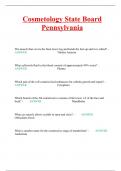
-
Cosmetology State Board Pennsylvania
- Exam (elaborations) • 29 pages • 2024
- Available in package deal
-
- $7.99
- + learn more
Cosmetology State Board Pennsylvania The muscle that covers the front lower leg and bends the foot up and in is called? - ANSWER Tibialis Anterior What yellowish fluid in the blood consists of approximately 90% water? - ANSWER Plasma Which part of the cell contains food substances for cellular growth and repair? - ANSWER Cyto...
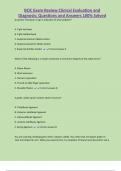
-
BOC Exam Review Clinical Evaluation and Diagnosis; Questions and Answers 100% Solved
- Exam (elaborations) • 66 pages • 2024
- Available in package deal
-
- $21.99
- + learn more
BOC Exam Review Clinical Evaluation and Diagnosis; Questions and Answers 100% Solved A positive Thompson's sign is indicative of what problem? A. Tight hip flexor B. Tight iliotibial band C. Ruptured anterior tibialis tendon D. Ruptured posterior tibialis tendon E. Ruptured Achilles tendon Correct answer-E Which of the following is a simple movement to check the integrity of the radial nerve? A. Elbow flexion B. Wrist extension C. Forearm supination D. Thumb-to-little finger opp...
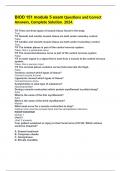
-
BIOD 151 module 5 exam Questions and Correct Answers, Complete Solution. 2024.
- Exam (elaborations) • 5 pages • 2024
-
- $10.88
- 1x sold
- + learn more
BIOD 151 module 5 exam Questions and Correct Answers, Complete Solution. 2024. T/F There are three types of muscle tissue found in the body. True T/F Smooth and cardiac muscle tissue are both under voluntary control. False T/F Cardiac and smooth muscle tissue are both under involuntary control True T/F The lumbar plexus is part of the central nervous system. False- this is a peripheral nerve T/F The musculocutaneous nerve is part of the central nervous system False T/F A motor signa...
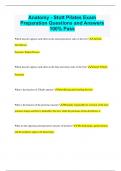
-
Anatomy - Stott Pilates Exam Preparation Questions and Answers 100% Pass
- Exam (elaborations) • 12 pages • 2024
- Available in package deal
-
- $9.99
- + learn more
Anatomy - Stott Pilates Exam Preparation Questions and Answers 100% Pass Which muscles oppose each other on the anteriorposterior sides of the foot? Anterior: Dorsiflexors Posterior: Plantar Flexors Which muscles oppose each other on the later and rotary sides of the foot? Lateral: Tibialis Peroneals What is the function of Tibialis anterior? dorsiflexing and inverting the foot. What is the function of the peroneas muscles? Primarily responsible for eversion of the foot. pero...
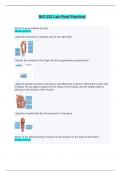
-
BIO 232 Lab Final Practical Exam (with pictures) - Questions with complete solutions
- Exam (elaborations) • 24 pages • 2024
-
- $22.99
- + learn more
BIO 232 Lab Final Practical Exam (with pictures) - Questions with complete solutions Which muscle extends the leg? Rectus femoris Label the structures in a lateral view of the right thigh. Classify the muscles of the thigh into their appropriate compartments. Label the gluteal muscles in the figure, and label their functions. Note that for each pair of labels, the top label is asking for the name of the muscle, and the bottom label is asking for the function of the muscle. Label the muscles t...
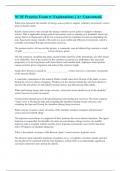
-
NCSF Practice Exam w/ Explanations || A+ Guaranteed.
- Exam (elaborations) • 29 pages • 2024
- Available in package deal
-
- $13.49
- + learn more
What term represents the transfer of energy across joints to support voluntary movement? correct answers kinetic chain Kinetic chain refers to the concept that energy transfers across joints to support voluntary actions. This is applicable during general movements such as running on a treadmill, where any energy that is not harnessed will be lost as heat and fail to contribute toward accomplishing the task. Successful energy transfer will result in a more stable and efficient environment, whi...

Study stress? For sellers on Stuvia, these are actually golden times. KA-CHING! Earn from your study resources too and start uploading now. Discover all about earning on Stuvia


